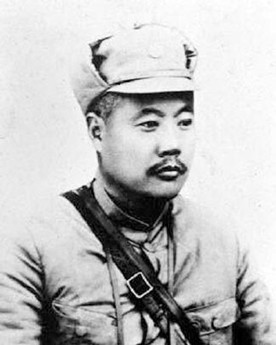Song Zheyuan facts for kids
Quick facts for kids
Song Zheyuan
宋哲元 |
|
|---|---|

General Song Zheyuan
|
|
| Born | October 30, 1885 Leling, Shandong, Qing dynasty |
| Died | April 5, 1940 (aged 54) Mianyang, Sichuan, Republic of China |
| Allegiance | |
| Years of service | 1907–1940 |
| Rank | General |
| Unit | Northwestern Army |
| Commands held | 29th Route Army |
| Battles/wars |
|
| Awards | Order of Blue Sky and White Sun |
| Other work | military advisor |
Song Zheyuan (Chinese: 宋哲元; pinyin: Sòng Zhéyuán; October 30, 1885 – April 5, 1940) was an important Chinese general. He played a key role in major conflicts like the Chinese Civil War and the Second Sino-Japanese War (1937–1945). He is remembered for leading the 29th Army.
Contents
General Song Zheyuan's Life
Early Life and Training
Song Zheyuan was born in 1885 in a village called Zhaohong. This village was in Shandong province, China. When he was young, his uncle, who was a teacher, taught him.
At age 20, in 1904, Song Zheyuan started studying at a military school in Beijing. He quickly became a favorite student of his teacher, Lu Jianzhang. Later, in 1912, Song worked under another important military leader, Feng Yuxiang.
Military Career and Key Roles
In 1917, Song Zheyuan led his army unit to help remove Zhang Xun. Zhang Xun had tried to bring back the old imperial rule. Song's unit was part of the Guominjun, a powerful army group.
By 1926, Song became the Governor of Jehol Province. He later became the head of Shaanxi province in 1927. His career involved many changes and challenges.
After a conflict in 1930, Song Zheyuan's troops became known as the 29th Army. They were stationed in southern Shanxi province. Their job was to protect the borders of Rehe and Chahar provinces from Japanese forces.
Defending Chahar Province
Song Zheyuan was the leader of Chahar province when Japan attacked in late 1932. Even though his 29th Army did not have as good weapons as the Japanese, they fought bravely. This fight was called the Defense of the Great Wall.
The Japanese army eventually won and entered areas near Beijing and Tianjin. Song Zheyuan was removed from his position for a short time. However, he was soon put back in charge of his army after an agreement was made.
Later Years and Challenges
In 1937, the Battle of Lugou Bridge began. Song Zheyuan's 29th Army faced the main attack from the Japanese army. His army suffered heavy losses in this battle.
The Japanese army then chased his remaining troops. Song's army was badly damaged in late 1937 and early 1938. The remaining soldiers had to fight as guerrillas, hiding in the mountains.
Song Zheyuan became very ill after these difficult times. He passed away in 1940 at the age of 54 in Mianyang County, Sichuan province. He had tried various medical treatments, but none helped him recover.
See also
 | Kyle Baker |
 | Joseph Yoakum |
 | Laura Wheeler Waring |
 | Henry Ossawa Tanner |

